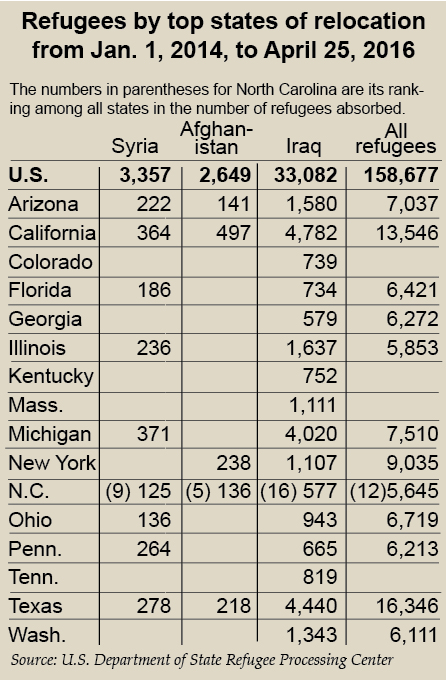The federal government relocated more Syrian refugees to North Carolina in the last six months than it did the previous 22 months, even as Gov. Pat McCrory and U.S. Rep. Richard Hudson, R-8th District, continue to warn that the screening process for admission to the United States remains broken, posing potential danger to the state.
 “We’re not given any forewarning of when they’re coming, where they’re going to, or who they are,” McCrory told Carolina Journal. That raises concerns, he said, because the refugees could be coming from countries embroiled in civil wars or they may be linked to Islamic terrorism.
“We’re not given any forewarning of when they’re coming, where they’re going to, or who they are,” McCrory told Carolina Journal. That raises concerns, he said, because the refugees could be coming from countries embroiled in civil wars or they may be linked to Islamic terrorism.
Refugees are sent to charity relocation agencies that “have more information than my state public safety officials,” McCrory said. The FBI does not have a list of entering refugees and where they are sent, prior to and after relocation, “which was astounding to me.”
The feds “use the privacy card” to deny that information to state and federal public safety officials, McCrory said.
That is a cause for “great concern,” he said. If refugees were involved in some criminal or terror-related activities, state law enforcement investigators would not know where to find them unless the nonprofit agencies provided the information. The state Department of Health and Human Services has some data the nonprofits have provided, but they’re not obligated to do so.
The DHHS Refugee Services Office receives information after a refugee is settled and begins to receive services, such as employment help or English language training, said DHHS spokeswoman Alexandra Lefebvre.
“The challenge is the lack of information sharing from the federal government about individuals prior to arriving in North Carolina,” Lefebvre said. “The state receives some information after the resettlement has taken place. The individual’s personal information is protected by various privacy laws.”
The FBI “does initial background checks on what they can,” but is not allowed to maintain that information due to the privacy regulations, McCrory said. He wanted to ask President Obama about that situation during a February National Governors Association meeting, “but the president wouldn’t take my question at the White House. I think he was given forewarning that I was going to ask.”
Hudson said North Carolina “absolutely” remains at risk because of the weak vetting process for refugees.
Last year he introduced the American Safe Act barring entry to the United States of any Iraqi or Syrian national unless the FBI director certified a thorough background check had been completed. The House passed it overwhelmingly. Senate Democrats blocked it from coming to that body for a vote.
“I hope we don’t have a problem with ISIS sneaking folks in through this program, but it’s definitely a vulnerability,” Hudson said.
“The three areas that I’m concerned about is the folks that can come here without a visa, the terrorists exploiting the Syrian refugee program, and our porous Southern border,” he said. “Until we get serious about that, we don’t know who and what’s coming across that border.”
Hudson said he continues to highlight the refugee vetting vulnerabilities, but “everybody’s moved on to another issue, and they’re pretending like this isn’t a problem,” even though two terrorists were arrested on Jan. 8 after entering the country on the refugee program, and the director of national intelligence “tells us that they’ve caught terrorists trying to come through the refugee program.”
Obama’s goal is to admit 1,500 Syrians per month, and expedite the screening process “that we know is already broken,” Hudson said. Some Democrats now want to raise the target number of Syrian refugees from 10,000 to as many as 100,000 Syrian refugees, he said.
Congress has heard reports of counselors “just overwhelmed with the number of people applying for visas, and needing to be screened,” Hudson said. Pushing 1,500 Syrians per month through a cheesecloth-like process already requiring between 18 and 24 month is “an absolute recipe for disaster, and I hope it’s not going to take some terrible incident to wake people up,” he added.
Jim Hanson, executive vice president of the Washington, D.C.-based Center for Security Policy, told CJ that identities and backgrounds of Syrians cannot be verified in most instances, regardless how many times interviews are conducted. He called Syria a nonfunctioning state with no U.S. embassy, government offices that have been ransacked, and official records and databases that have been destroyed or are missing.
Jimmy Broughton, McCrory’s deputy chief of staff, on Nov. 18 told the Joint Legislative Committee on Government Operations “the difficulty of thorough background checks was again confirmed” by the White House in a Nov. 17 teleconference with the nation’s governors and their staffs.
Frank Perry, secretary of the state Department of Public Safety, told the Gov Ops committee that collaboration between federal agencies and state intelligence personnel authorized to receive all sensitive information collected about the refugees “simply doesn’t exist. [That’s] sad as to how they are not communicating” at state and federal levels.
Perry said he believes some of the Syrian refugees already in North Carolina could present a threat.
“Alerts are going out as we speak that are serious,” but not imminent,” he said. “There are people here who seriously mean to harm us.”
State Rep. John Szoka, R-Cumberland, a retired Army infantry officer in whose district Fort Bragg is located, issued a stark warning at the Gov Ops meeting.
“Make no mistake, ISIS is our enemy,” Szoka said. “They’ve told us that they are our enemy. In fact, in North Carolina they’ve told us that Fayetteville and New Bern are targets that they want to hit.”